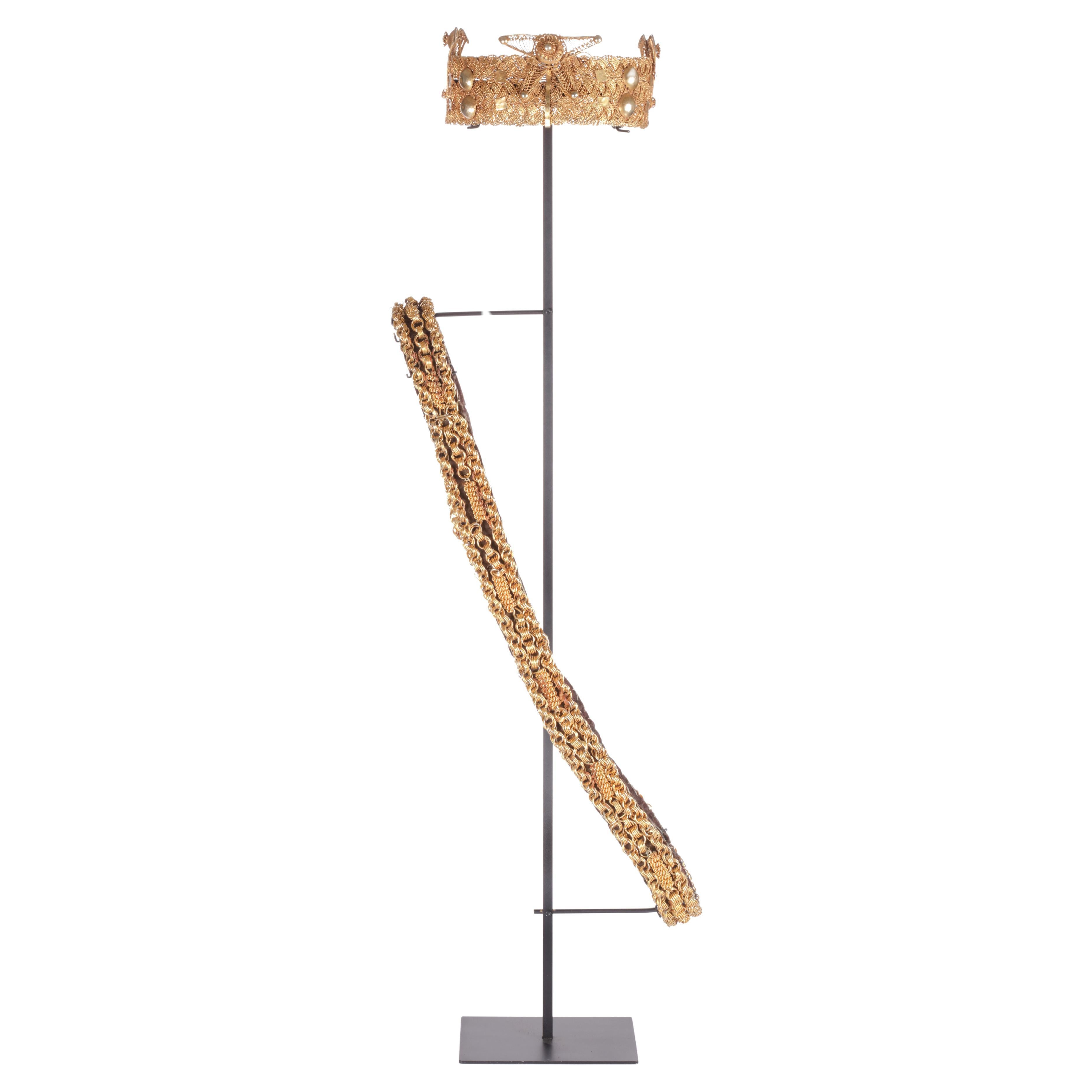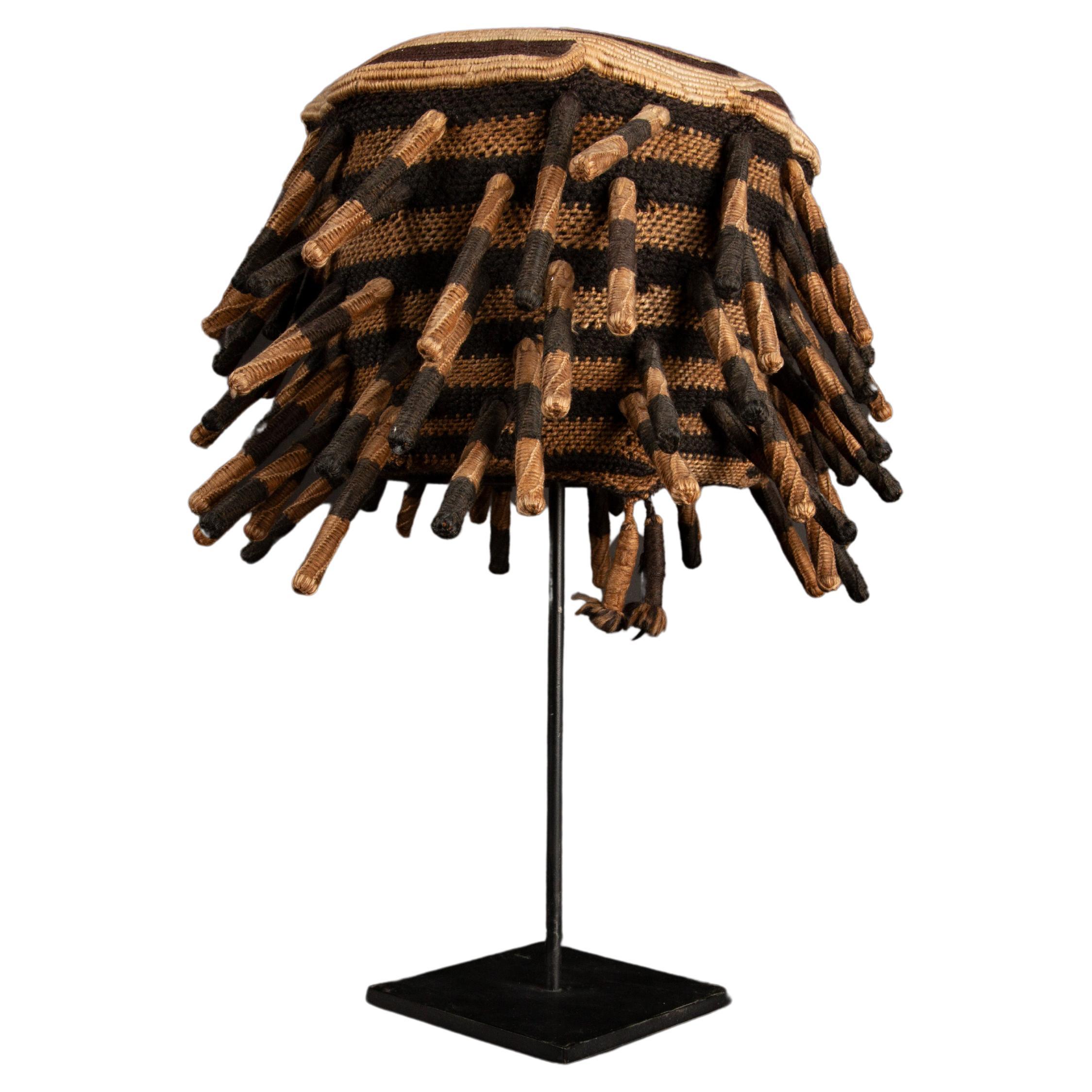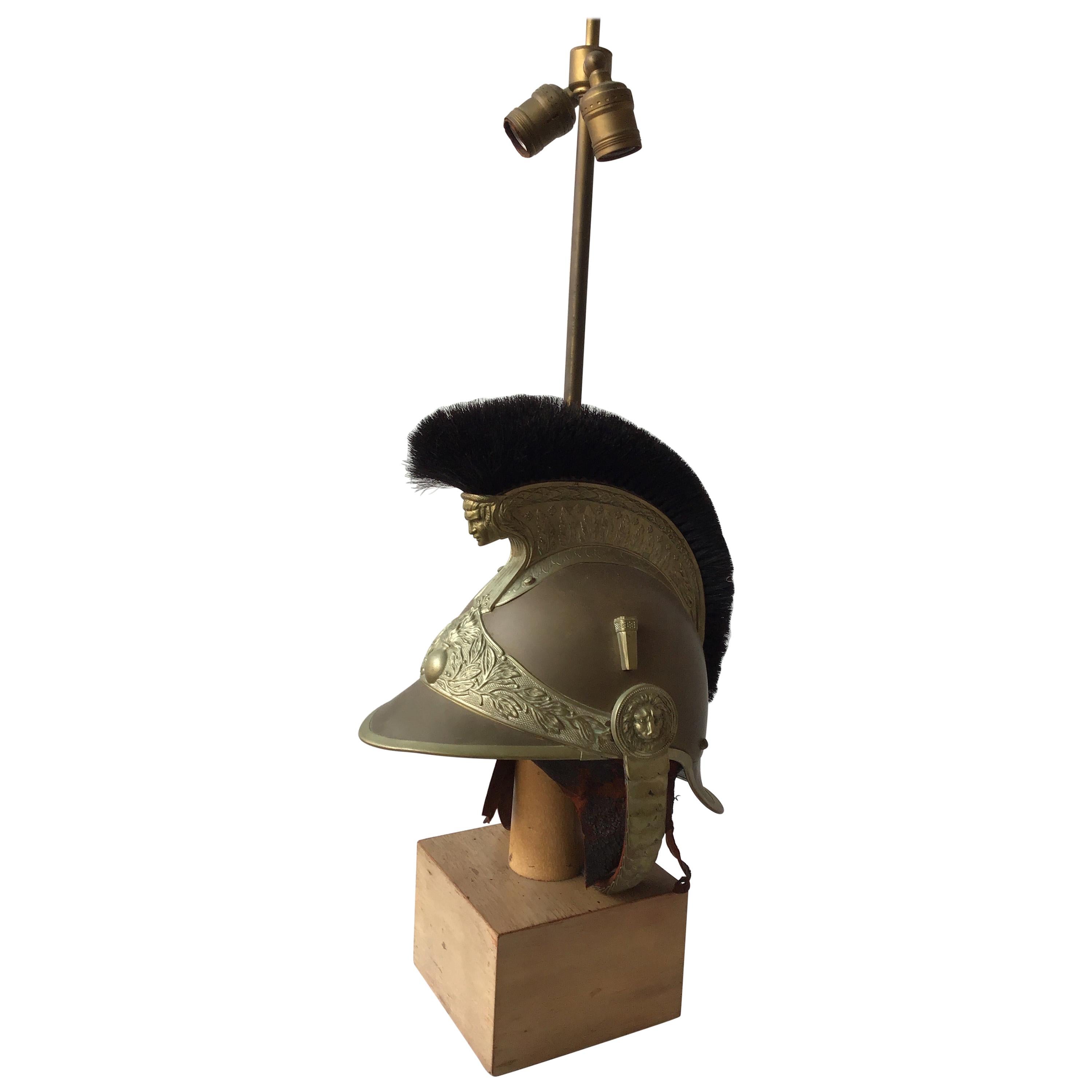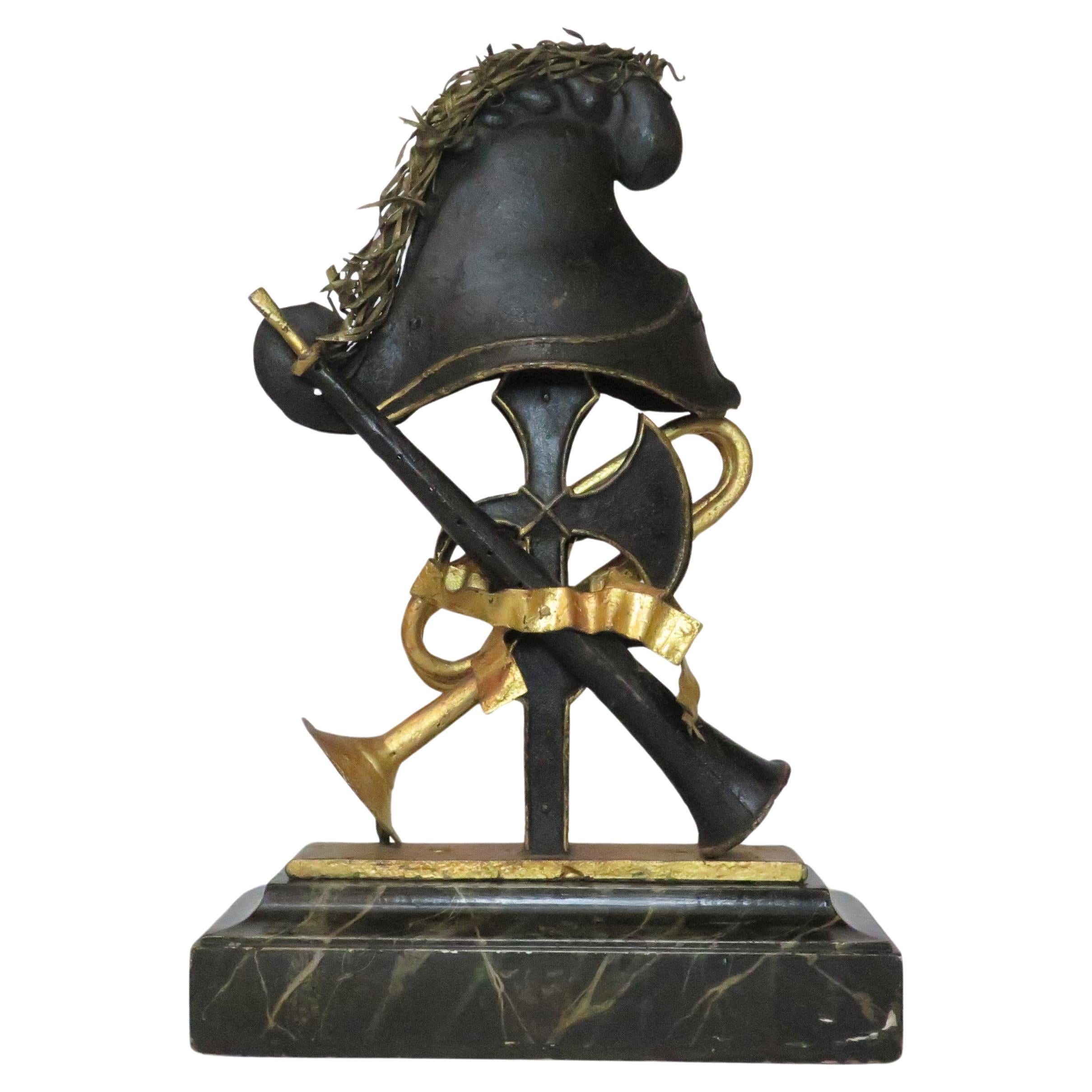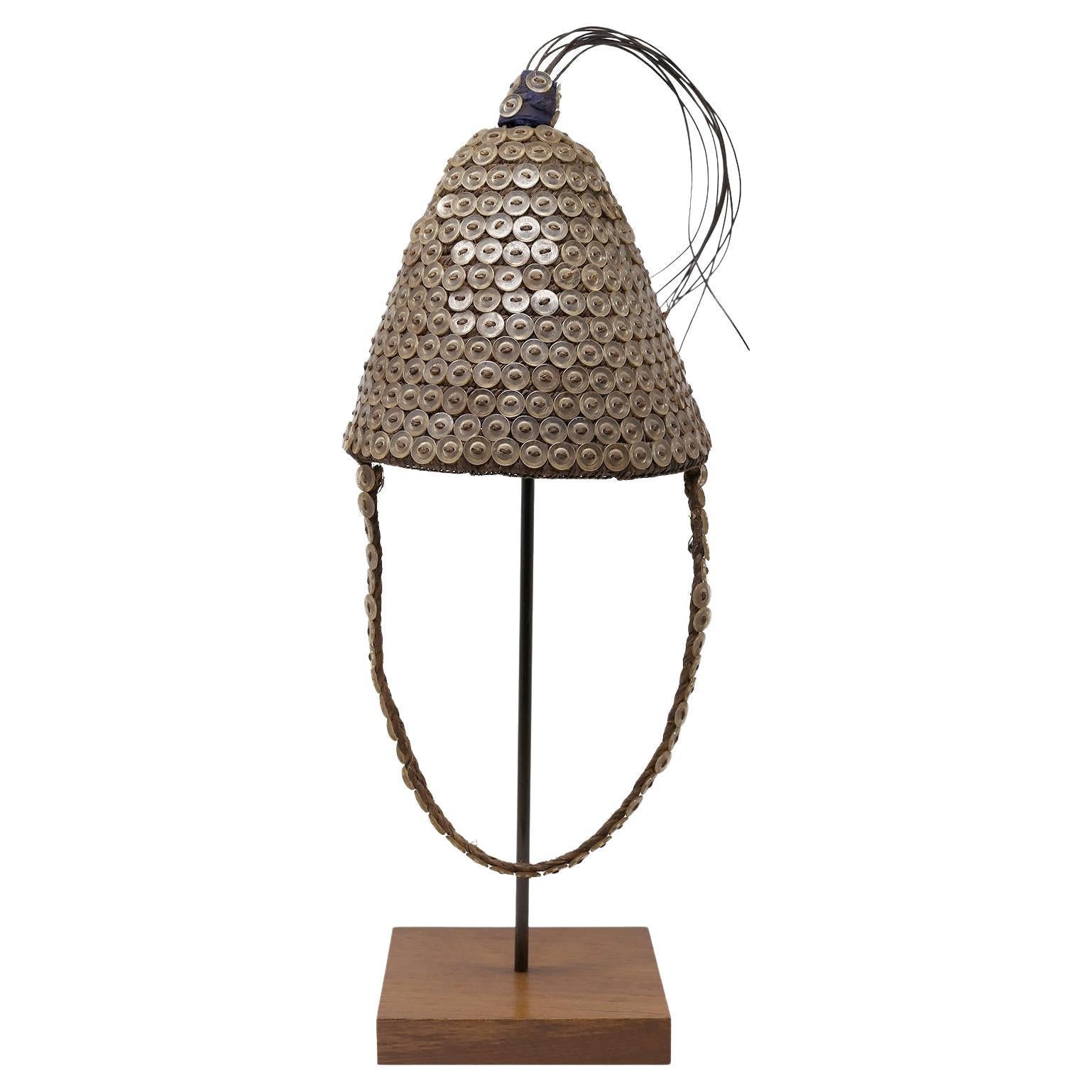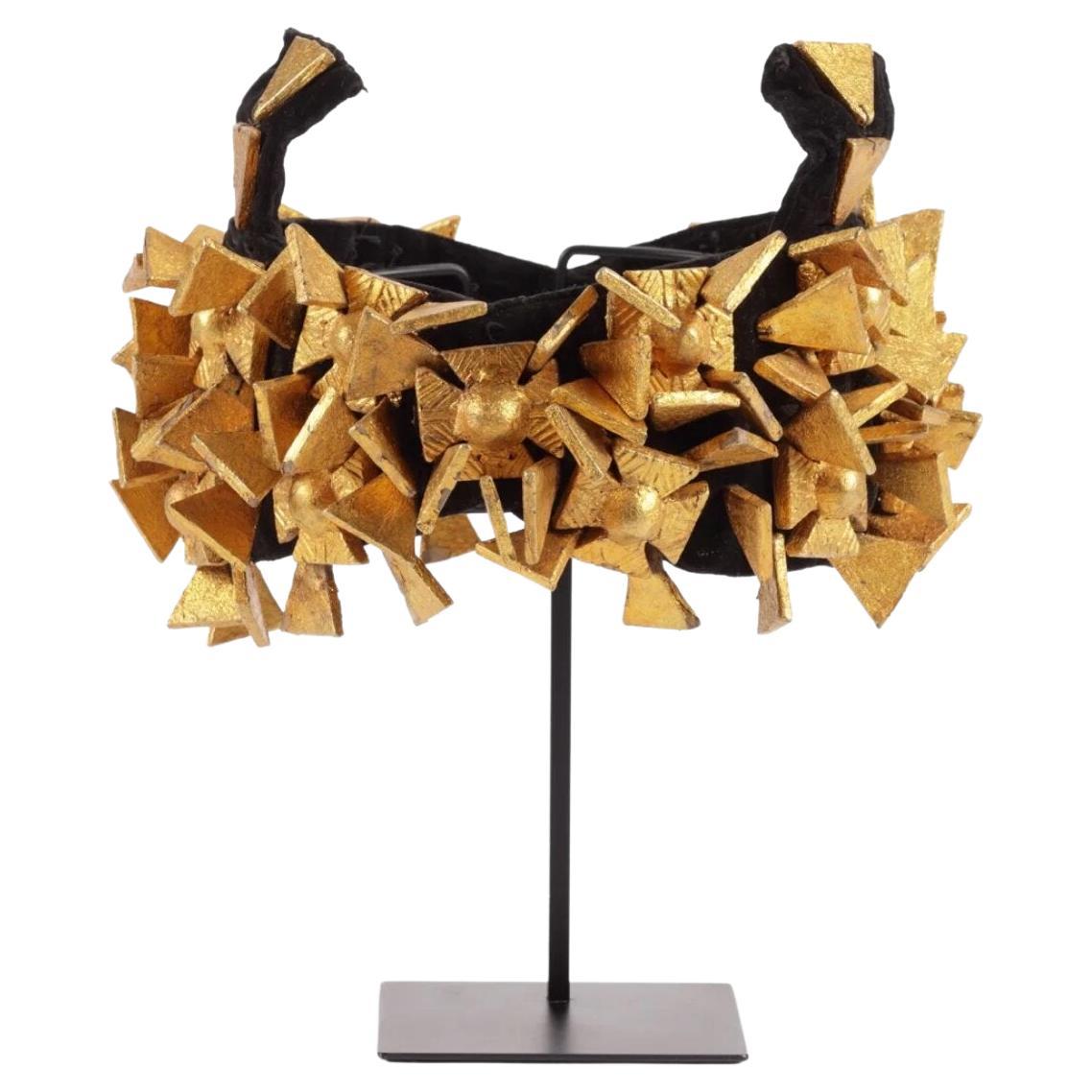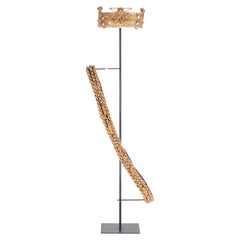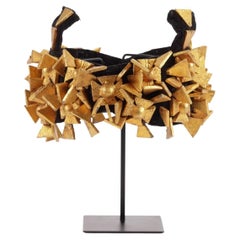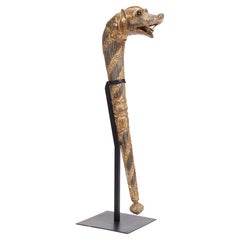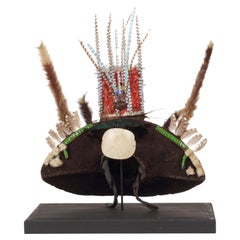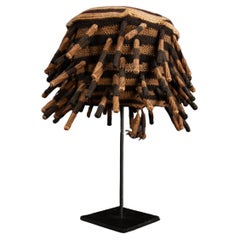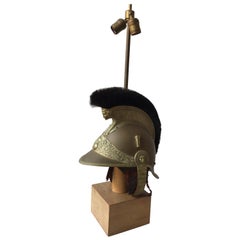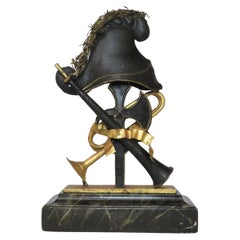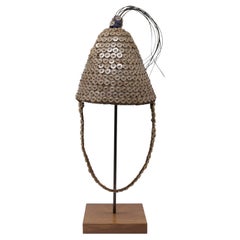Items Similar to African Chief’s gilt Crown and Sceptre in the form of a Pith helmet and pipe
Want more images or videos?
Request additional images or videos from the seller
1 of 7
African Chief’s gilt Crown and Sceptre in the form of a Pith helmet and pipe
$14,857.84
£11,064.45
€12,500
CA$20,513.25
A$22,741.97
CHF 11,951.79
MX$278,324.41
NOK 149,265.74
SEK 140,100.83
DKK 95,170.83
About the Item
A splendid Bouelé Chief’s gilt-wood crown and sceptre in the form of a Pith helmet and pipe
Ivory coast, late 19th/early 20th century
H. 13 x L. 33.5 x D. 26 cm (crown)
L. 14 cm (sceptre)
H. 51 cm (incl. stand)
Provenance:
Collection of a French colonial government official, Paris (collected in 1900-1910); thence by descent to his daughter
The sash, in gold and gilt-metal on velvet, is completely of traditional Ashanti form. The filigree crown however in our opinion shows clear influence from the Art Nouveau styles in vogue in Europe in the early 20th century.
Rivalry between the Ashanti Kings or Chiefs was, and still is, common in the region. A chief, who before flaunted with a traditional crown, clearly thought the ‘fashionable’ Pith helmet of a European colonialist or visitor would outshine the crown of his neighbouring competitor. Certainly, this gilt wood version, together with a sceptre in the form of a European pipe, did the job. Nowadays, Bouelé people are still seen wearing fashionable designer brand sunglasses, purses, or other accessories, all made of gilt wood.
- Dimensions:Height: 31.5 in (80 cm)Width: 9.85 in (25 cm)Depth: 11.82 in (30 cm)
- Materials and Techniques:Giltwood
- Place of Origin:
- Period:1900-1909
- Date of Manufacture:Circa 1900
- Condition:Wear consistent with age and use.
- Seller Location:Amsterdam, NL
- Reference Number:1stDibs: LU5458233745172
About the Seller
5.0
Recognized Seller
These prestigious sellers are industry leaders and represent the highest echelon for item quality and design.
Established in 1985
1stDibs seller since 2020
23 sales on 1stDibs
Typical response time: 5 hours
- ShippingRetrieving quote...Shipping from: Amsterdam, Netherlands
- Return Policy
Authenticity Guarantee
In the unlikely event there’s an issue with an item’s authenticity, contact us within 1 year for a full refund. DetailsMoney-Back Guarantee
If your item is not as described, is damaged in transit, or does not arrive, contact us within 7 days for a full refund. Details24-Hour Cancellation
You have a 24-hour grace period in which to reconsider your purchase, with no questions asked.Vetted Professional Sellers
Our world-class sellers must adhere to strict standards for service and quality, maintaining the integrity of our listings.Price-Match Guarantee
If you find that a seller listed the same item for a lower price elsewhere, we’ll match it.Trusted Global Delivery
Our best-in-class carrier network provides specialized shipping options worldwide, including custom delivery.More From This Seller
View AllAshanti African Chief’s ceremonial gold and gilt-metal crown and sash on stand
Located in Amsterdam, NL
An Ashanti Chief’s ceremonial gold and gilt-metal crown and sash
Ghana, early 20th century
Diam. 20 cm (crown)
L. 128 cm (sash)
H. 102 cm (incl. st...
Category
Early 20th Century Ghanaian Art Nouveau Tribal Art
Materials
Gold, Gold Plate, Metallic Thread
Traditional Ashanti African Chief’s velvet and gilt-wood Leopard crown on stand
Located in Amsterdam, NL
A traditional Ashanti Chief’s velvet and giltwood Leopard crown
Ghana, early 20th century
Diam. 17 cm (crown)
H. 27 cm (incl. stand)
Provenance:
Pri...
Category
Early 20th Century Ghanaian Antiquities
Materials
Velvet, Giltwood
An Indian part-gilt silver-clad ceremonial sceptre or mace with a tiger’s head
Located in Amsterdam, NL
Northern India or Deccan, late 19th century
L. approx. 82 cm (excl. stand)
Provenance:
Private collection, United Kingdom
This remarkable gilt-silver soonta (ceremonial sceptre) also known as choba (ceremonial mace) with a tiger's head stands out as an unparalleled example. It has a wooden base, clad with thick sheet part-gilt silver and has fine details such as teeth and a curling tongue. Especially with the inlaid glass eyes, in combination with the grand sculptural design, it would have been integral to an Indian maharaja’s attire, known as lawajama in North India and biruthus in South India, as referenced by Jackson & Jaffer. They would symbolise authority, power, and sometimes an attribute of various deities, particularly those associated with strength or combat. For instance, the Hindu god Hanuman, known for his immense strength, is often depicted holding a mace (*chob* or gada in Sanskrit). Similarly, the god Vishnu and his avatar Krishna are also frequently depicted with a mace among their other attributes.
Courtiers would raise these sceptres wrapped in rich brocades, with the head visible, during processions, signalling their association with the monarch. Alongside fly-whisks and standards, they were indispensable in ceremonial parades, underscoring the ruler's prestige. Terlinden notes that a soonta berdar was tasked with carrying the sceptre. These individuals, proficient in courtly manners, played key roles during audiences, from managing entrances to introducing guests. Their esteemed position often earned them generous rewards, including land grants. See for a depiction of sceptres in use the top right of a painting in the collection of the V&A, titled Processional scene with Amar Singh, ruler of Thanjavur (Tanjore), and Sarabhoji, from circa 1797.
For a very comparable piece, but with an elephant’s head, see the collection of the Indian Museum, Kolkata. For other less similar examples, see the V&A Museum London.
Sources:
A. Jackson & A. Jaffer, Maharaja: The Splendour of India’s Royal Courts, London, V&A Publishing, 1999
Christiane Terlinden Serra, Mughal Silver...
Category
Antique Late 19th Century Indian Metalwork
Materials
Silver
A Huli wigman's ceremonial headdress
Located in Amsterdam, NL
Papua New Guinea, Central Highlands, Huli people, 1st half 20th century
Crafted from the wearer’s own hair and adorned with colorful bird-of-paradise feathers, flowers, scarab beetl...
Category
20th Century Papua New Guinean Tribal Art
Materials
Shell, Feathers
An exquisite warrior's headdress or 'Kaibauk'
Located in Amsterdam, NL
Amarasi district, Kupang regency, West Timor island, early 20th century
Category
Early 20th Century Timorese Tribal Art
Materials
Metal
An Illongot headdress
Located in Amsterdam, NL
Ifugao, Northern Philippines, 19th century
Decorated with different kinds of beadwork and the bill of a Kalaw bird (hornbill).
Historically, only those who had proven themselves th...
Category
Antique 19th Century Philippine Tribal Art
Materials
Shell, Natural Fiber, Wood, Beads
$2,852
You May Also Like
Prestige and Tradition: The Mounted Ashetu Hat of the Bamum and Bamileke People
Located in New York, NY
Adorned with spiked braids, this prestigious custom mounted Ashetu hat embodies the cultural significance of the Bamum and Bamileke people of Cameroon, Central Africa, who revered th...
Category
20th Century Cameroonian Tribal Mounted Objects
Materials
Metal
1840s French Fireman’s Helmet Lamp on Base
Located in Tarrytown, NY
1840s French fireman’s helmet lamp.
Category
Antique 1840s Table Lamps
Materials
Brass
Sculpture / Phrygian Helmet on a Halberd with Crossed Horns
Located in Dallas, TX
a French sculpture, paint and parcel gilt metal, of a Phrygian helmet (with gilt details) including gilt feather trim, on a halberd, with crossed horn and a gold trumpet, a gilt ribb...
Category
Antique 19th Century English Sculptures and Carvings
Materials
Iron
Mukuba 'Hat', Bwami Society, Lega Culture, Democratic Republic of Congo
Located in Point Richmond, CA
Mukuba (Hat), Bwami Society, Lega Culture, Democratic Republic of Congo
1st Half 20th Century
Plant fiber, buttons, elephant tail hair, blue cloth
7...
Category
20th Century Congolese Other Tribal Art
Materials
Cotton, Natural Fiber
Indo Persian Steel and Brass Khula Khud Helmet
Located in Moreno Valley, CA
Indo Persian steel and brass Khula Khud Helmet.
Central Asia, Indo-Persian culture, circa early 20th century.
A fine hammered metal steel and brass Islamic khula khud helmet of a domed form with an additional brass top finial.
The top features radiating striations etched across the exterior and a tall brass spike finial with hammered line the lower periphery of the helmet, and a contiguous swath of chain mail hangs down to protect the wearer's neck.
Dimensions: 22 in height total x 8 diameter.
top hat is 8 in. x 7 in h to top finial.
Metal base is 6.5 in. x 6.5 in.
Indo Persian reproduction of an antique Islamic Helmet...
Category
Vintage 1930s Indian Islamic Arms, Armor and Weapons
Materials
Metal
French Military Helmet
Located in San Francisco, CA
C. 20th century
French Military helmet.
Category
20th Century Mounted Objects
Materials
Metal
